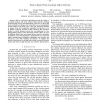Free Online Productivity Tools
i2Speak
i2Symbol
i2OCR
iTex2Img
iWeb2Print
iWeb2Shot
i2Type
iPdf2Split
iPdf2Merge
i2Bopomofo
i2Arabic
i2Style
i2Image
i2PDF
iLatex2Rtf
Sci2ools
GLOBECOM
2009
IEEE
2009
IEEE
The Directional Attack on Wireless Localization -or- How to Spoof Your Location with a Tin Can
—802.11 localization algorithms provide the ability to accurately position and track wireless clients thereby enabling location-based services and applications. However, we show that these localization techniques are vulnerable to non-cryptographic attacks where an adversary uses a low-cost directional antenna to appear from the localization algorithm’s perspective to be in another arbitrary location of their choosing. The attacker’s ability to actively influence where they are positioned is a key distinguishing feature of the directional attack relative to prior localization attacks that use transmit power control to introduce localization errors. We implement a representative set of received signal strength-based localization algorithms and evaluate the attack in a real office building environment. To mitigate the attack’s effectiveness, we develop and evaluate an attack detection scheme that offers a high detection rate with few false positives.
GLOBECOM 2009 | Localization Algorithm Perspective | Localization Algorithms | Prior Localization Attacks | Telecommunications |
| Added | 21 May 2010 |
| Updated | 21 May 2010 |
| Type | Conference |
| Year | 2009 |
| Where | GLOBECOM |
| Authors | Kevin S. Bauer, Damon McCoy, Eric W. Anderson, Markus Breitenbach, Gregory Z. Grudic, Dirk Grunwald, Douglas C. Sicker |
Comments (0)

